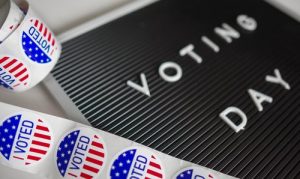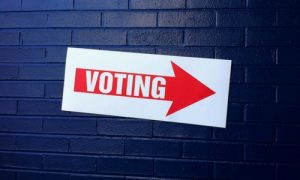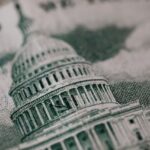With Super Tuesday now over, both parties are a little closer to selecting their presidential candidates, though the picture is clearer for the Democrats.
Republican presidential front-runner Donald Trump notched resounding victories in Illinois, North Carolina and Florida, but lost Ohio to its Governor, John Kasich. Missouri remains too close to call, with Trump leading against the junior U.S. Senator from Texas, Ted Cruz, by less than half a percent.
Hillary Clinton widened her lead against Bernie Sanders in the Democratic primaries, winning Florida, North Carolina, Ohio and Illinois. Swing state Missouri also remains too close to call on the Democratic side.
As the frontrunners on both sides come into sharper focus, it’s worth parsing their positions on free trade and how their positions square with most economists’ longstanding beliefs on free trade. While many U.S. regions have rebounded from the Great Recession, an uneven recovery has left many other areas in the dust. Unemployment remains high for many blue collar Americans, especially those without a college degree, and wage growth remains stagnant.
Primary candidates on both sides of the aisle have sounded decidedly protectionist notes on trade this election cycle, blaming agreements like the North American Free Trade Agreement (NAFTA) for American job losses and companies moving manufacturing facilities to foreign countries. The 1993 Clinton Administration trade deal lifted most tariffs on goods traded between the U.S., Mexico and Canada.
Take Donald Trump’s position on NAFTA in an interview on CBS 60 Minutes:
“It’s a disaster. … We will either renegotiate it, or we will break it. Because, you know, every agreement has an end. … Every agreement has to be fair. Every agreement has a defraud clause. We’re being defrauded by all these countries.”
Hillary Clinton now says she opposes the Pacific Rim trade agreement, even though she previously supported the agreement when she was secretary of state. The Pacific Rim trade deal lowers tariffs and bolsters trade between the U.S., Japan, Malaysia, Vietnam, Singapore, Brunei, Australia, New Zealand, Canada, Mexico, Chile and Peru.
Clinton has also said her husband’s signature trade deal, NAFTA, needs to be reassessed and “adjusted” and any new trade agreements postponed.
“I think we do need to take a deep breath and figure out how we can make it work for the greatest numbers of people,” Clinton told USA TODAY. Clinton said NAFTA’s benefits have gone to the rich and taken jobs from blue collar Americans.
Clinton’s foe, Bernie Sanders, also has made opposing free trade the centerpiece of his campaign. He’s accused Clinton of supporting “disastrous” free trade pacts.
Ted Cruz vigorously opposes the U.S. Export-Import Bank, which helps U.S. exporters sell their goods abroad. The government-run Export-Import Bank operates on money it borrows from the U.S. Treasury Department. It uses the money to make loans, provide loan guarantees and credit insurance to help U.S. companies sell their products abroad.
The lone pro-trade candidate is Gov. John Kasich, who has been the most unabashed trade supporter.
So how does all of this anti-trade rhetoric square with Economics 101?
Not well.
Most global economists overwhelmingly agree that free trade is a no-brainer. While some individual players may lose jobs as companies move business overseas, free trade benefits the economy as a whole and also lowers the costs of goods in America.
Adam Davidson of Gimlet Media does an excellent job of breaking down free trade and its benefits. Davidson is a writer for The New York Times who writes about the economy. Davidson says most Americans would not be better off in a world in which we had not signed NAFTA and we had not helped create and join the WTO and we had raised, rather than lowered import tariffs. Davidson says very few economists would blame international trade for domestic economic troubles.
“First of all, the idea that raising tariffs will benefit a broad group of Americans is utterly rejected by the economics profession. It’s simply not a political idea. It’s an economic-illiterate idea. There was a poll, for example, several years ago when 97 percent of economists said tariffs are dangerous and not good policy. And I set out on a mission to find those 3 percent who said tariffs are a good idea. And the only ones I could find said yes, tariffs are a good idea for poor, developing nations. But I could not find a single economist – and I talked to very left-wing ones, very right-wing ones, centrist ones – I have never found a single economist who supports tariffs.”
Davidson says that’s because tariffs are a crude tool enriching government officials and the owners of less competitive and less efficient businesses that can’t hold their own in the real economy. In overly simplistic terms: tariffs enrich failed businesses.
So why all the anger about trade?
Trade may better the nation as a whole, but does not better each individual. Try telling the Indiana laborer who lost his job that trade has made every item in his house a little cheaper. He’s likely skeptical that trade enriches his life. And if he lost his job, he’s very likely to turn out to vote for a candidate blaming the source of his strife on trade.
Economists generally agree that full employment can exist with free and open trade. The main issue is not the overall number of jobs, but the skills in which workers employ to do those jobs. In other words, American should import the goods it can acquire more cheaply from other nations, and we should export goods in which we have advantages over other nations. The key: to keep Americans skilled in the newest emerging technologies as some skills become obsolete.
So the next time you report on a local factory closure or more jobs being outsourced overseas you can dig a little deeper. Would imposing a tariff or higher taxes on the factory’s owner have changed the scenario? What real issues are at play? How do experts say your local region can help workers who lost their jobs remain competitive in a changing economy?
“Shipping containers” by Flickr user Sam Greenhalgh cc license CC by-NC-ND 2.0.











